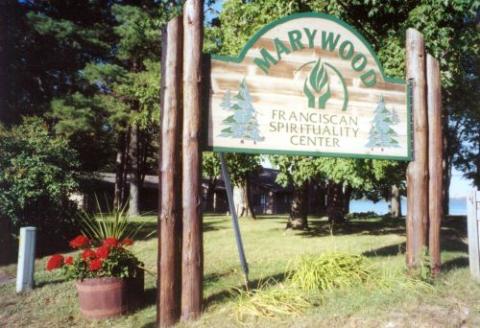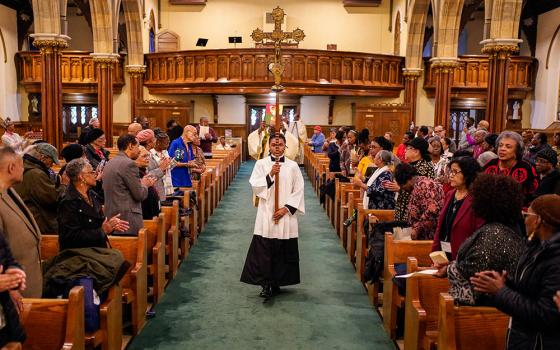Lac du Flambeau Business Development Corporation CEO Larry Turner (left) and Lac du Flambeau Band of Lake Superior Chippewa Indians President John Johnson Sr. (right) look on as Sr. Sue Ernster signs title documents for property the Franciscan Sisters of Perpetual Adoration had owned Oct. 31. The nearly 2-acre parcel is about 15 minutes east of the Lac de Flambeau Reservation. (Courtesy of the Franciscan Sisters of Perpetual Adoration)
A congregation of sisters in Wisconsin made history Oct. 31.
The Franciscan Sisters of Perpetual Adoration have sold their spirituality center to the Lac du Flambeau Band of Lake Superior Chippewa Indians. This is the first Catholic institution to return land to a Tribal Nation in the name of reparations for colonialism and residential boarding schools, according to officials involved in the sale.
The Lac du Flambeau band settled on this land in 1745, but it was stolen from them under an 1842 treaty so unfair a court in 1976 declared it "unconscionable."
The nearly 2-acre parcel is on Trout Lake near Arbor Vitae, Wisconsin, about three hours northwest of Green Bay and about 15 minutes east of the Lac de Flambeau Reservation. The Marywood Franciscan Spirituality Center property, home to a main lodge, meeting center and four cabins, was appraised at $2.6 million. The sisters sold it to the tribe for the same price they paid for it in 1966 — $30,000, or just over 1% of its current value.
"There's some pretty strong emotions of letting go, because people have had really good memories and experiences here," Franciscan president Sr. Sue Ernster told Global Sisters Report. "But it's not only the letting go — there's also the rejoicing of how we can break the system that created the trauma and the division between us and the original caretakers of the land."
When the congregation bought the land from a private owner, it was being used as a resort. The sisters in their first decades of ownership used it as a provincial and regional headquarters; in 1992 they began to also use it as a spirituality center and in 1998 the spirituality center became its sole function.
The main lodge is seen at the Marywood Franciscan Spirituality Center in Arbor Vitae, Wisconsin. The Franciscan Sisters of Perpetual Adoration sold the site to its original owners, the Lac du Flambeau Band of Lake Superior Chippewa Indians, for about 1% of its value on Oct. 31. (Courtesy of the Franciscan Sisters of Perpetual Adoration)
"This return represents more than the restoration of land — it is the restoration of balance, dignity and our sacred connection to the places our ancestors once walked," John Johnson Sr., tribal president, said in a statement. "The Franciscan Sisters' act of generosity and courage stands as an example of what true healing and partnership can look like. We are proud to welcome Marywood home, to ensure it continues to serve future generations of the Lac du Flambeau people."
After the closing of the sale on Oct. 31, a tribal ceremony, followed by a feast, was held at the property, where Ernster presented Johnson with a painting by Marywood's longest-serving artist-in-residence, Sr. Karen Kappell.
"On behalf of the Franciscan Sisters of Perpetual Adoration, I am deeply honored to present this painting as a gift — a symbol of relationship, gratitude and shared purpose. … For us, it reflects the hope and respect that have guided this journey of returning the Marywood land to your care," Ernster told Johnson. "As we place this land back in your hands, we also place our gratitude and our friendship in your hearts."
Ernster said in an earlier interview this move allows the congregation to go beyond a land acknowledgement statement and live out their faith.

The sign for the Marywood Franciscan Spirituality Center stands outside the lakefront property in Arbor Vitae, Wisconsin. (Courtesy of the Franciscan Sisters of Perpetual Adoration)
In 2022, the Franciscans began working with Land Justice Futures, an organization that helped change the way the sisters thought about land and land ownership. As they finished the two-year curriculum, they realized that others could be better caretakers of the property than they could.
Brittany Koteles, co-founder and director of Land Justice Futures, said they are deeply honored by the Franciscans going through their program and then making the transfer, but the congregation built the relationship with the tribe and made the agreement on their own.
"They went through the program, and then they went and did it — they flew the nest," Koteles said.
'As we place this land back in your hands, we also place our gratitude and our friendship in your hearts.'
—Sr. Sue Ernster
Koteles said the sale is important because nearly a quarter of the Lac du Flambeau reservation acreage is owned by non-Indigenous people and most lakefront property in the area is privately owned.
"Lakefront up there is for the rich, and usually white," Koteles said. "They can’t even access their own lakes."
Tribal officials say the Marywood property could become home to cultural and traditional events, and possibly housing for health care workers who serve the reservation.
Jessica Intermill, of Intermill Land History Consulting, researched the history of the property and how it went from tribal land to being owned by the sisters. In a 2024 presentation to the Fransican Sisters of Perpetual Adoration, Intermill explained how the land was stolen, but also acknowledged the dichotomy of benefitting from horrible choices made by others.
"We didn't make these choices," Intermill says in a recording of the presentation, but "they still exist today. … We hold land that the United States stole on purpose to populate with white bodies."
Tribal Elder Tinker Schuman and Sr. Marla Lang embrace at the ceremony marking the transfer of the Marywood Franciscan Spirituality Center to the Lac du Flambeau Band of Lake Superior Chippewa Indians Oct. 31. Schuman offered programming at the center for many years during the time Lang ministered there. (Courtesy of the Franciscan Sisters of Perpetual Adoration)
The congregation has been dealing with its history and trying to rebuild broken relationships since 2020, when it learned that the Native American boarding school it operated for nearly 90 years in northern Wisconsin was a place of trauma and heartache for the generations of Native children that attended. That school, which the sisters had been proud of, was on the reservation of the Bad River Band of Lake Superior Chippewa.
The Marywood land transfer is a way to begin repairing the damage done between whites and Indigenous, Ernster said.
"So we engaged with the (Lac du Flambeau) tribe to see if they would be interested in having a conversation with us," she said. "There was a lot of vulnerability on both sides to dialogue without having a strong, long history together."
It has also helped the sisters, she said.
"It's really been healing for us as FSPAs as we grapple with our complicity," Ernster said. "Now that we know better, how do we behave differently and authentically live in relationship? … We're looking at relationships rather than business transactions."
Koteles said the sale is a radical act of faith.
"This is interacting with generations of broken relationships, broken treaties, of traumas, of heartbreaking history," she said. "It is a radical act to step into a process of transitioning land and putting relationships first. We're not taught to do that and that's not the history we've inherited. That's not the way the world works."
Advertisement
Koteles said Land Justice Futures is not about selling land to tribes at market value, which she does not consider repatriation.
"Land Justice Futures is about repairing the way ecological and social harm is tied up in the way we do business," she said. "It's the old adage of it's not your fault, but it is your responsibility."
Koteles said Land Justice Futures only stepped back into the picture in this case to help tell the story, because the Fransican Sisters of Perpetual Adoration want it to be an example.
"If we do this work right," she said, "this is just the first of many."
Johnson said in a statement that the land transfer is much more than just a property sale.
"The Lac du Flambeau Tribe extends heartfelt gratitude to the Franciscan Sisters of Perpetual Adoration for their commitment to healing and justice," Johnson's statement said. "This land, known to our people for centuries, carries the songs, stories, and spirits of our ancestors. As it returns to our care, we honor their memory by continuing to live in harmony with the waters, forests, and all living things that make this place sacred. The circle is being made whole once again."








